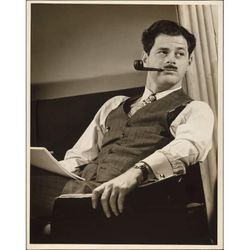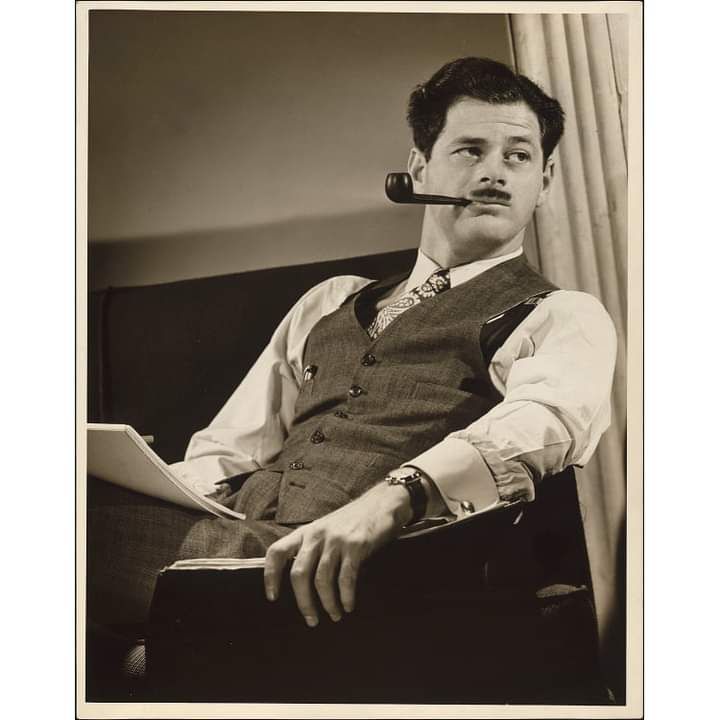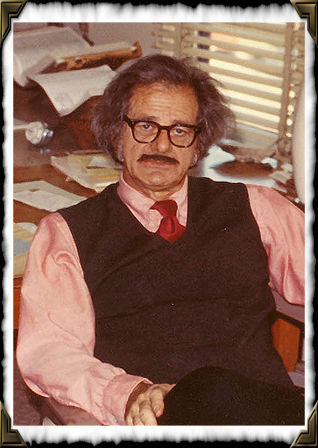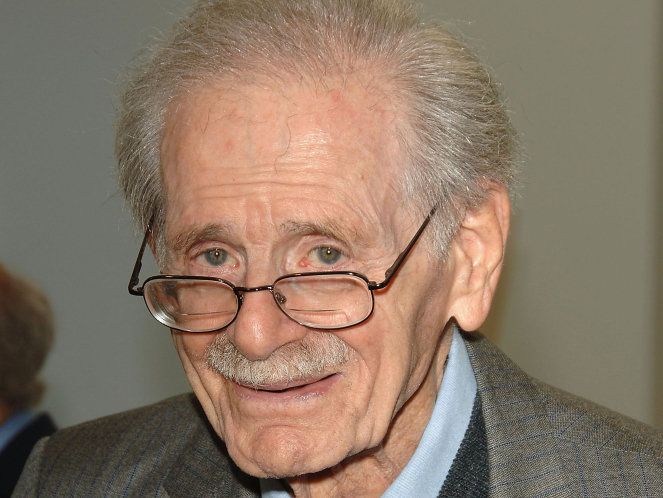Corwin died Tuesday at his Los Angeles home of natural causes, according to the USC Annenberg School for Communication & Journalism where Corwin remained a writer in residence until his death.
During a career that spanned more than 70 years, Corwin wrote, produced and directed for radio, television, film and the stage.
~~~~
Norman Lewis Corwin was an American writer, screenwriter, producer, essayist and teacher of journalism and writing. His earliest and biggest successes were in the writing and directing of radio drama during the 1930s and 1940s.
Norman Corwin was among the first producers to regularly use entertainment—even light entertainment—to tackle serious social issues. In this area he was a peer of Orson Welles and William N. Robson, and an inspiration to other later radio/TV writers such as Rod Serling, Gene Roddenberry, Norman Lear, J. Michael Straczynski and Yuri Rasovsky.
He was the son of Samuel and Rose Corwin and was born in Boston, Massachusetts. Norman Corwin was a major figure during the Golden Age of Radio. During the 1930s and 1940s he was a writer and producer of many radio programs in many genres: history, biography, fantasy, fiction, poetry and drama. He was the writer and creator of series such as The Columbia Workshop, 13 By Corwin, 26 By Corwin and others. He recently was a lecturer at the University of Southern California.
Norman Corwin won a One World Award, two Peabody Medals, an Emmy, a Golden Globe, a duPont-Columbia Award; he was nominated for an Academy Award for Writing Adapted Screenplay for Lust for Life (1956). On May 12, 1990, he received an Honorary Doctorate from Lincoln College. In 1996 he received the Doctor of Humane Letters honoris causa from California Lutheran University. Norman Corwin was inducted into the National Radio Hall of Fame in 1993.
A documentary film on Norman Corwin's life, A Note of Triumph: The Golden Age of Norman Corwin, won an Academy Award for Best Documentary in 2006. Les Guthman's feature documentary on Norman's career, Corwin aired on PBS in the 1990s. He was inducted into the Pacific Pioneer Broadcasters Diamond Circle in 1994.
Norman Corwin wrote several books, which include Trivializing America; plus many essays, letters, articles and plays.
During the 1990s, Norman Corwin returned to radio drama, producing a series of radio plays for National Public Radio. In 1993, Norman Corwin was finally inducted into the Radio Hall of Fame after a long career. And in 2001, NPR aired six new plays by Norman Corwin under the title More By Corwin. He also lectured at USC as a visiting professor and was also on the Advisory Board of the National Audio Theatre Festival. Norman Corwin celebrated his 100th birthday in May 2010.
Corwin died Tuesday at his Los Angeles home of natural causes, according to the USC Annenberg School for Communication & Journalism where Corwin remained a writer in residence until his death.
During a career that spanned more than 70 years, Corwin wrote, produced and directed for radio, television, film and the stage.
~~~~
Norman Lewis Corwin was an American writer, screenwriter, producer, essayist and teacher of journalism and writing. His earliest and biggest successes were in the writing and directing of radio drama during the 1930s and 1940s.
Norman Corwin was among the first producers to regularly use entertainment—even light entertainment—to tackle serious social issues. In this area he was a peer of Orson Welles and William N. Robson, and an inspiration to other later radio/TV writers such as Rod Serling, Gene Roddenberry, Norman Lear, J. Michael Straczynski and Yuri Rasovsky.
He was the son of Samuel and Rose Corwin and was born in Boston, Massachusetts. Norman Corwin was a major figure during the Golden Age of Radio. During the 1930s and 1940s he was a writer and producer of many radio programs in many genres: history, biography, fantasy, fiction, poetry and drama. He was the writer and creator of series such as The Columbia Workshop, 13 By Corwin, 26 By Corwin and others. He recently was a lecturer at the University of Southern California.
Norman Corwin won a One World Award, two Peabody Medals, an Emmy, a Golden Globe, a duPont-Columbia Award; he was nominated for an Academy Award for Writing Adapted Screenplay for Lust for Life (1956). On May 12, 1990, he received an Honorary Doctorate from Lincoln College. In 1996 he received the Doctor of Humane Letters honoris causa from California Lutheran University. Norman Corwin was inducted into the National Radio Hall of Fame in 1993.
A documentary film on Norman Corwin's life, A Note of Triumph: The Golden Age of Norman Corwin, won an Academy Award for Best Documentary in 2006. Les Guthman's feature documentary on Norman's career, Corwin aired on PBS in the 1990s. He was inducted into the Pacific Pioneer Broadcasters Diamond Circle in 1994.
Norman Corwin wrote several books, which include Trivializing America; plus many essays, letters, articles and plays.
During the 1990s, Norman Corwin returned to radio drama, producing a series of radio plays for National Public Radio. In 1993, Norman Corwin was finally inducted into the Radio Hall of Fame after a long career. And in 2001, NPR aired six new plays by Norman Corwin under the title More By Corwin. He also lectured at USC as a visiting professor and was also on the Advisory Board of the National Audio Theatre Festival. Norman Corwin celebrated his 100th birthday in May 2010.
Family Members
Sponsored by Ancestry
Advertisement
Advertisement










